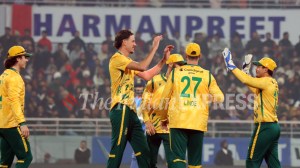Why Lucky Ali’s RE:SOUND tour feels like more than just a comeback
Singer Lucky Ali on touring at 67, his ‘unrefined’ voice and leaving the Hindi film industry where he didn’t really know anyone.
 Lucky Ali (Photo by Umed Jadeja)
Lucky Ali (Photo by Umed Jadeja)
For someone who has always wanted to run away from the spotlight and still battles “stage fear” , singer Lucky Ali, at 67, is on the road again. This time for an eight-city tour, titled ‘RE:SOUND’.
In the Capital last week, at the start of his two-month tour, Ali arrived wearing his signature calm as if it were an old pashmina – frayed at the edges but warm and with many stories to tell. The screams of the audience caught him off guard. “Thank you for coming,” he said and repeated it throughout the show, as if still not convinced that they had all shown up.
From millennials who grew up with his music as the soundtrack to their own disquiet, as well as Gen Z who discovered his O sanam on YouTube, everyone came. Ali, with his grey hair, weathered beard and traces of time on the face, sang in that same raw, unrefined voice. The kind that felt like finding an old friend. They were flawed but they were ours. Age, says Ali, has made him “peaceful” as an artiste. “My voice is still unrefined. It is not a trained voice. I sing the way that I feel the music. I don’t sit down for riyaaz,” says Ali.
View this post on Instagram
Luck has always been a complicated word for Ali. He was named after it on the day of his arrival; also when his father, the legendary actor Mehmood, signed his first commercial break, Chhoti Bahan (1959). Ali never liked the endearment. Largely because he felt he was always broke. His disciplinarian father was particular with money given to children. He didn’t like his given name, Maqsood Mehmood Ali, much either. It chained him to his father’s fame and success, besides the expectations of becoming a commercial actor and a life that Ali resisted. So he became Maqsoom Ali. “It means ‘divided’. I felt divided between my two names,” says Ali, in a Zoom conversation.
In fact, that’s how the credits rolled when he was a narrator in Shyam Benegal’s Bharat Ek Khoj (1988–89) and in Trikaal (1985), a multi-cast story set in Goa. “My father wanted me to act in films and I really didn’t want to. At the same time, I didn’t want to break his heart. I couldn’t see myself dancing. When I had to in Kaante (2002), I died out of embarrassment. My dad was not very happy that I went into art cinema,” says Ali.
Growing up in a family of actors – with Mehmood being one of India’s most celebrated comedians, his grandfather and actor Mumtaz Ali, his aunt and character artiste/dancer Minoo Mumtaz and his mother Madhu’s sister and Indian cinema’s tragedy queen Meena Kumari – Ali saw the make-believe world up close. As close as he was to “Meena khaala”, this world often unsettled him. “Within the beauty of creativity, there was a lot of pain, which was something I wasn’t ready to spend time with,” says Ali.
But music was a sanctuary. When musicians like RD Burman came home for sittings or when he accompanied his father to recording studios, music felt like a comforting space, “you could fit within”. His stepmother, Mehmood’s second wife, gave him his first guitar when he turned 13. “I didn’t know how to play but I was excited. I ran to the terrace and started plucking,” says Ali. He remembers the famed Ghar aaja (Chhote Nawab, 1961) , being rehearsed and recorded. For someone who never trained, this listening was the only music schooling he had.
But making music was also an act of rebellion. “It’s something I understood,” he says. But Ali was still trying to find himself when his father decided to make Dushman Duniya Ka (1996) – the story of a boy named Lucky, who gets caught up with drugs and eventually kills his mother. Ali’s own tryst with marijuana is likely to have prompted the film. “I couldn’t handle that he was making that film. It was a mother-oriented and I was sensitive about situations regarding mothers,” says Ali.
In the same year, Ali would go on to release Sunoh, his debut album at 37. While Mehmood “was surprised”, the album – conversational with simple melodies – stuck a chord in the indie-pop era. Its chart-topper – O sanam – made him an instant success. He followed it with Sifar, Aks and Gori Teri Aaakhen, playback for Kaho Naa Pyaar Hai (2000) besides acting and singing inTanuja Chandra’s Sur (2002).
But “I didn’t want to bring these characters home,” he says, who would leave Mumbai at the drop of a hat. The disillusionment with the industry grew when it became Bollywood. “We had seen great filmmakers pass through those doors and then we saw the end of that space. It wasn’t motivating enough to stick with. I wanted to sit down and make music. My best friend was Tarun (Guru Dutt’s son) and he committed suicide in1989. It didn’t make sense for me to be at a place where I actually didn’t know anybody,” says Ali, who began spending more time at his farm just outside of Bangalore with family and various animals. It is also where his father is buried.
That distance from fame also became part of the myth. The voice was raw and the notes wavered sometimes, but it didn’t matter for fans for whom his music acquired this quality of a man searching for something more than just fame.
While at the farm, Ali also ran a carpet cleaning business and worked at an oil rig. When one of his videos singing in Goa to a small sun-dappled crowd went viral during the pandemic, for many, it felt as if Lucky Ali was back. Gen Z was completing his songs. “When I can’t get to a high note, I turn the microphone towards them,” says Ali, who at the moment isn’t too excited about AI making music. “People will need to decide whether they like a soulless approach or not. For me, listening to a person can never replace anything”
As for the tour, it could be his swan song. “It is possibly my last connect with the public,” said Ali in a concert statement. His friends think otherwise. But whether or not this truly marks his farewell, as there is more music left in Lucky Ali as there is unpredictability, the new generation may just draw him back.
- 01
- 02
- 03
- 04
- 05































